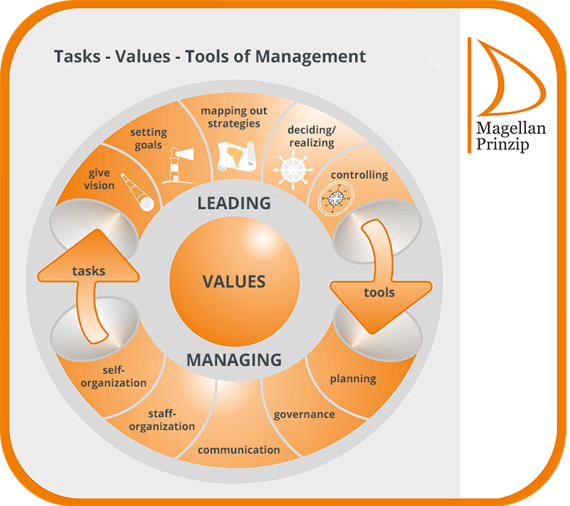Magellan Principle
Key details of this training course
- maps the leadership process completely and coherently
- makes successful leadership reproducible at any time
- is principled, future-proof, open to methods
- is easy to learn and effective
Duration
Cours format
Modules –
practice & theory
Training content Leading
Basic principles of leadership
- Recognising the principles of leadership
- Applying the tasks of a leader
- Exercising entrepreneurial demands on the manager
- Understanding and knowing the difference between leading and managing and its effects
Giving a vision
- Knowing and applying the basics of a vision
- Using the vision as an orientation and source of strength for all concerned
- Recognising the importance and viability of a vision’s impact
- Using visions as the beginning of any life cycle of products or companies
Setting goals
- Applying the basics of goals
- Setting goals clearly
- Using goals to give direction to the business
- Regarding goals as milestones on the path to fulfilling the vision
- Using goals as a measure of the degree to which the vision has been achieved
Mapping out strategies
- Knowing the principles of strategy building
- Grasping the effectiveness of a strategy
- Recognising the connection to the tasks of management
- Using strategies as the highest form of action
- Using strategies as a guideline for taking measures
Deciding and realizing
- Knowing the principles for making decisions
- Knowing the connection between decision-making and realisation
- Recognising the connection between successful process flows and decisions
- Using strategies as the primary mode of action
- Formulating clear responsibilities for successful realisation
Controlling
- Understanding the principles of controlling
- Using controlling as motivation
- Using the right approaches to controlling
- Recognising the link between controlling and achieving the vision and objectives
- Knowing the opportunities and risks of controlling and keeping them in mind
“Where there is a goal,
there is also a way.”
Training content Managing
Values
- The fundamental impact of values on the success of the company
- Authenticity through lived values
- Providing meaning through values
- The effect of values on the motivation of all participants
Planning
- planning tools and methods,
- SWOT analysis,
- cost-benefit analysis portfolio analysis,
- benchmarking,
- core indicator systems…
… are applied.
Governance
- organisational structure,
- decision matrix for employees,
- core competences, process organisation,
- bottleneck analysis, quality standards,
- corporate identity (CI)…
… are applied.
Communication
- basic models of human behaviour and motives,
- brain architecture and communication models,
- communication tools,
- conflict analysis and conflict management, phases of team development,
- practical simulation of dialogue situations…
… and how to apply them.
Staff-organisation
- basics on the use of leadership styles,
- staff potential analysis,
- staff indicators, staff needs analysis,
- appraisal systems, reward systems,
- further training for employees in the HR sector..
… and how to apply them.
Self-organisation
- own time management,
- distinction between “urgent” and “important”,
- the different thematic fields of time management,
- time organisation methods,
… and how to apply them.
The training sessions

Methods that are fun to use
Benefits for companies
Space for new methods and strategies
The Magellan Principle promotes …
- Clearer structures and responsibilities within the departments
- Better communication
- Higher satisfaction among all employees
- More commitment and higher motivation of each individual
- Scope for new ideas, products and developments
- More sales potential with existing customers through new products
- More sales potential through new market segments
- More effective time management
Unleashing potential
Successful teamwork
Developing key competences
- social competence (leadership, conflict management, capacity for teamwork, …)
- communicative competence (conversation skills, rhetoric, behavioural models, …)
- analytical skills (analytical and structured thinking, strategy development, …)
- methodological competence (analysis models, control models, strategic orientation …)
- self-management (time management, self-organisation, …)
… and how to apply them.








